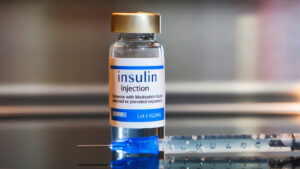Understanding New Rules Regarding Insulin Costs & Rights to Switch Plans
 Bottle of insulin injection with a syringe on black table and stainless steel background. One of the many good provisions in the Inflation Reduction Act of 2022 (IRA) is the cap on out-of-pocket costs for all insulin drugs. The IRA limits out-of-pocket costs to no more than $35 per 30-day insulin prescription under all Medicare drug prescription plans. Plans also cannot charge a deductible for insulin. This means that a 60-day supply would be no more than $70, etc. And for those enrolled in Part D’s Extra Help, they will continue to pay their lower co-pay amounts.
Starting July 1, 2023 the same $35 cap per 30-day supply will apply for insulin used in traditional insulin pumps (covered by Medicare Part B).
These are significant cost-saving changes that will have a positive impact on many. Yet, as mentioned in an earlier article, this positive change is not reflected in Medicare Plan Finder’s drug cost estimates as the law took effect too late to be updated. As a result, when people researched their insulin drugs costs on the Plan Finder during Medicare’s Open Enrollment, the old, out-of-date, most-likely higher copays that plans were going to charge for insulin drugs still appeared. And these numbers won’t change until plans submit their next annual bid cycle with their Plan Benefit Package in spring/summer of 2023 to display the information for the 2024 plan year.
Therefore, if you or someone you know realize you made a wrong plan choice based on inaccurate insulin copay costs, you can call 1-800-Medicare and ask for a Special Enrollment Period (SEP) to change plans. The opportunity to ask for a SEP runs from December 8, 2022 through December 2023. You can use this SEP one time to enroll in a new plan.
For help in understanding your insulin coverage and costs, and choosing a plan which plan best meets your needs at the lowest cost is you’re using a SEP, contact your local Health Insurance Counseling and Advocacy Program (HICAP) (or your local SHIP if you’re another state) for free and unbiased assistance.
Read more. |
